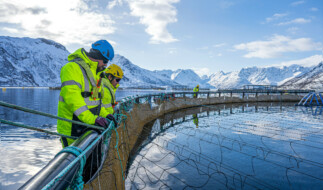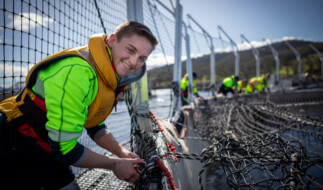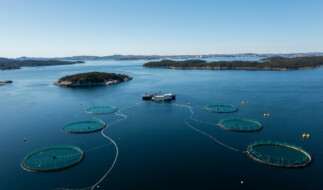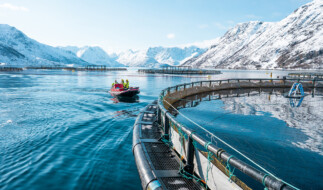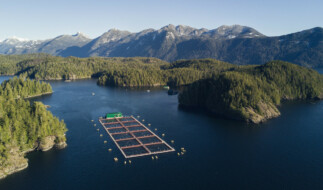GIVE IT 100%: HOW GSI SALMON FARMERS SUPPORT THE OCEAN PANEL’S OCEAN ACTION AGENDA

In a year of unprecedented challenges, last week saw one crucial milestone worth celebrating. Fourteen national leaders adopted the world’s most ambitious ocean sustainability effort ever seen. As members of The High Level Panel for a Sustainable Ocean Economy, each leader committed to sustainably managing 100% of their country’s ocean areas by 2025.
This is significant, as these leaders collectively manage 40% of the world’s coastlines, spanning six continents. This new agenda translates knowledge and science into recommendations for transformative action. It can be a turning-point for building a Sustainable Ocean Economy – one that realizes humanity’s fate is bound to that of the ocean.
There is no denying that humanity’s well-being is intertwined with the health of the ocean. The ability of the ocean to provide food is a key part of that, and yet it is currently vastly under-realized. The Ocean Panel demonstrates that when managed better and sustainably, the ocean could produce up to six times more food than it does today – and it could do so with a low environmental footprint.
Which is why as an active member in the Advisory Network to the High Level Panel, Global Salmon Initiative (GSI) will give it 100% to deliver on the five building blocks for a Sustainable Ocean Economy. Here’s how we’re taking action.
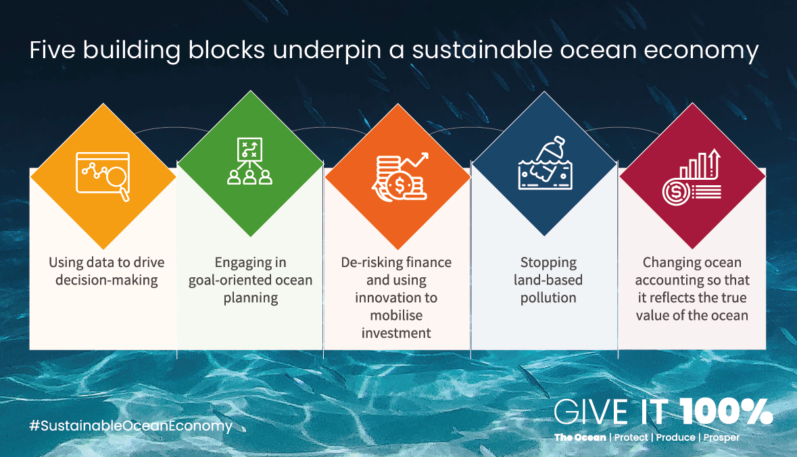
1. Using data to drive decision-making
You can’t change what you don’t track, so the Ocean Panel calls for creating global data networks that collect and share important data, like fish stocks or emissions, across the entire ocean supply chain. Transforming fragmented data points into rich, open-access data platforms opens up new possibilities for sustainable ocean management.
Knowledge-sharing to help promote the highest levels of sustainable practices is core to GSI’s mission. By pooling and sharing knowledge, we have a much better chance of identifying challenges and finding solutions. So that’s exactly what we do. We share, we solve, and we innovate. Data is crucial to this. Through our annual Sustainability Report and working groups, we share relevant environmental and social performance data to facilitate discussions and help ensure our farms are continually improving. In support of the sustainable Ocean Action agenda, we are committed to transparent reporting to help drive industry improvements and share our knowledge as part of a Sustainable Ocean Economy.
2. Engaging in goal-oriented ocean planning
As the Ocean Panel outlines, our health, wealth and wellbeing are linked to those of the ocean. But, ocean planning hasn’t always recognized these links. And yet, we have the science, local experience and traditional knowledge to transform uncoordinated measures into collective impact.
Collaboration is core to GSI’s mission for supporting a sustainable and healthy planet and population. This includes working within our sector to ensure continuous improvements, working with regulators to build a sustainable industry that meets local and global environmental, economic and governance priorities, engaging with local communities to promote positive social contributions, and partnering with groups such as the Ocean Panel, World Wildlife Fund, and the UN Global Compact to ensure we are part of the bigger picture in supporting sustainable ocean ecosystems.
3. De-risking finance and using innovation to mobilize investment
Investments made today in sustainable ocean management can yield triple wins for people, nature and the economy. But, current investment is inadequate and the Ocean Panel highlights that four times as much is needed to restore and sustainably maintain ocean health.
GSI works hard to promote innovation across our membership. This includes research into novel oils to complement sustainable feed ingredients and new farming practices, including AI-based data reporting as part of farm management. In fact, one of the case studies highlighted in the Ocean Panel report featured these next generation offshore farming facilities. Many of our members are also pioneering the use of green bonds to direct financing into sustainable developments, such as farm certifications and climate mitigation strategies.
4. Stopping land-based pollution
Our pursuit of sustainable gains for people, planet and prosperity can be waylaid by another P word: pollution. Unfortunately, pollution on land also winds into waterways, wreaking havoc on the ocean and life underwater. The Ocean Panel recommends introducing sweeping changes in responsible waste management, reducing reliance on plastics, and eliminating pollution.
As ocean farmers, we see the impact of ocean pollution every day and it is devastating. We therefore take our role as ocean stewards very seriously, which is why we have projects for both preventing and removing plastic pollution. Through our new initiatives on responsible plastic use, we are enhancing our work with local communities and schools to increase awareness on ocean plastics, continuing to take part in and support local beach clean-up campaigns, continually looking for ways to remove plastics where possible from our supply chain through the use of alternatives, and promoting responsible use and recycling initiatives.
5. Changing ocean accounting so that it reflects the true value of the ocean
A single economic indicator can’t do justice to all the ways the ocean nourishes us, enriches us culturally and spiritually, and sustains livelihoods. The Ocean Panel wants the ocean’s diverse contributions accounted for and applied to decision-making. Within its report, The Ocean Panel lays out the barriers and opportunities for better documenting the value of the ocean.
We know that long-term health of the ocean depends on us actively recognizing that its contributions go beyond the pennies, and cover many aspects of human life from food, jobs to climate and tourism. There is no set answer on what a new ocean accounting framework looks like yet, but we are committed to working transparently and collaboratively to find a new way forward for the benefit of the ocean and humanity.
Making Ocean Panel Recommendations a Reality
GSI recognizes that meeting the world’s growing protein demands requires a shift in how we manage food systems on land and in the ocean. Responsibly farmed salmon can help provide a healthy and sustainable option…and one that people around the world have enjoyed for centuries.
Our eyes are on the clock, which is ticking. We do not have unlimited time for Ocean Action. With milestones like the United Nations’ first-ever Food Systems Summit next year, and the potential for a rescheduled Ocean Conference, we have multiple opportunities to sustain action and accountability. However, we need all hands on deck to fulfill our shared ambitions. GSI members are united in making the Ocean Panel’s recommendations a reality through responsible salmon farming.
